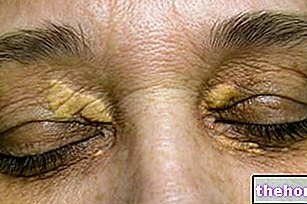Definition
Ovarian cancer originates in the female reproductive organs (gonads), which are responsible for producing egg cells. There are three types of ovarian tumors:
- Germinal tumors of the ovary: 5% of the tumors of the ovary. Typical tumors of the childhood and adolescent period
- Epithelial ovarian tumors: 90% of ovarian neoplasms. They originate from the epithelial cells of the ovum
- Stromal ovarian tumors: 4% of ovarian tumors. They originate from the stroma of the gonads.
Causes
There is no precise and unambiguous cause at the base of ovarian cancer; rather, it is possible to identify the major risk factors involved in the onset of this complex malignant neoplasm: age over 40, infertility (not associated with anovulation), early menarche, late menopause, genetic predisposition for ovarian and breast cancer, previous history of endometriosis, Caucasian population.
Symptoms
Unfortunately, ovarian cancer does not start with particular symptoms: what has been said represents a serious problem for the early diagnosis of cancer, so much so that sick women run the risk of being diagnosed too late. Ovarian cancer begins with symptoms comparable to those of mild bladder / intestinal affections: aerophagia, irregular menstrual cycle, diarrhea, digestive difficulties, dyspareunia, abdominal swelling, nausea, tendency to urinate often.
The information on Ovarian Cancer - Drugs for the Treatment of Ovarian Cancer is not intended to replace the direct relationship between health professional and patient. Always consult your doctor and / or specialist before taking Ovarian Cancer - Medicines to Treat Ovarian Cancer.
Medicines
Early diagnosis of ovarian cancer is essential to increase the chances of survival for the sick woman; as we have seen, early diagnosis is heavily hindered by the asymptomaticity - or in any case by the non-specificity of the symptoms - linked to the onset of the disease.
As soon as ovarian cancer is discovered, the woman will have to undergo surgery as soon as possible, which is essential to allow for therapeutic staging. Clearly, surgical treatment will be more or less radical, depending on the severity of the cancer.
More or less drastic surgical options based on the extent of the neoplasm:
- Total hysterectomy: removal of the uterus
- Salpingo-oophorectomy: excision of the ovaries and fallopian tubes (salpingi)
- Partial removal of the omentum: (the serous layer that lines the abdominal and pelvic cavity)
- Removal of lymph nodes or other tissues in the abdomen
After the surgery, the woman with cancer is usually treated with chemotherapy drugs, in order to destroy any malignant cells, which were not removed during the surgery. The sick woman can also use chemotherapy in case of relapses.
The following are the classes of anticancer drugs most used in the therapy against ovarian cancer, and some examples of pharmacological specialties; it is up to the doctor to choose the most suitable active ingredient and dosage for the patient, based on the severity of the disease, the state of health of the patient and his response to treatment:
- Carboplatin (eg. Paraplatin, Carboplatin PFZ, Carboplatin TEVA) the chemotherapy drug is used for the treatment of ovarian cancer in monotherapy, especially for recurrent forms. The recommended dosage is 360 mg / m2 intravenously, to be repeated on the same day every 4 weeks. It is also possible to administer the drug in association with cyclophosphamide (eg Endoxan Baxter): in this case, the drug combination is indicated to treat advanced ovarian cancer (carboplatin: 300 mg / m2 intravenously, to be repeated in the same day every 4 weeks + cyclophosphamide: 600 mg / m2 iv, to be repeated every 4 weeks, on the same day, for 6 cycles).
- Paclitaxel (eg Paxene, Abraxane) class: taxanes. Used for the treatment of ovarian cancer in the advanced stage, ie when the diseased cells have moved beyond the ovary. Often, the drug is used in combination with cisplatin. Generally, the drug is taken at a dosage of 175 mg / m2 iv (3-hour infusion), every 3 weeks, followed by a dose of cisplatin; alternatively, take 135 mg / m2 for 24 hours, every 3 weeks, followed by cisplatin. with these two drugs for an old tumor of the ovaries, it is recommended to maintain the same posology just described, avoiding the association with cisplatin.
- Doxorubicin (eg. Adriblastina, Caelyx, Doxorubicin ACC, Myocet) the anticancer drug is generally prescribed for patients with advanced stage ovarian cancer, especially if treated with platinum-based chemotherapy, who are no longer able to carry out their own therapeutic activity. Initial dose: 40-60 mg / m2 i.v. every 3-4 weeks (so that the disease does not get worse).
- Melphalan (eg. Alkeran, coated tablets or solution for injection) the chemotherapy drug is used for the treatment of ovarian cancer (in particular for epithelial types), at a dosage of 0.2 mg / kg per day for 5 days, in doses single, repeated every 4-5 weeks.
- Bevacizumab (Avastin) the recommended dose for ovarian cancer is 15 mg per pound of body weight every 3 weeks.
- Topotecan (Topotecan Teva, Topotecan actavis, Potactasol, Hycamtin, Topotecan hospira) particularly indicated for the treatment of ovarian cancer in the metastic stage, after the failure of other chemotherapy drugs. It is recommended to take the drug at a dosage of 1.5mg / m2 by intravenous infusion of 30 minutes, for 5 consecutive days. Repeat the cycle every 21 days (counting from the day you start taking the drug). In the absence of tumor progression, 4 courses of therapy are usually required.
- Cisplatin (eg. Cisplatin ACC, Platamine, Pronto Platamine) it is recommended to take 100 mg / m2 i.v. every 4 weeks, for the metastatic stage of ovarian cancer. A dose of 75-100 mg / m2 can be taken in combination with other chemotherapeutic agents such as cyclophosphamide. The drug is also indicated in case of tumor confined to the ovaries: the dosage is 60-90 mg / m2 in two liters of 0.9% sodium chloride solution, intraperitoneally.
For the prevention of allergic forms, before starting treatment with chemotherapy, patients with ovarian cancer are generally treated with corticosteroids and antiallergics. Also, since chemotherapy drugs tend to cause stomach acid, patients can take antacid drugs (H2 antagonists).
In case of confirmed ovarian cancer, it is possible to use radiotherapy, even if its use is often limited to bone and lymph node metastases, for purely palliative purposes.




























